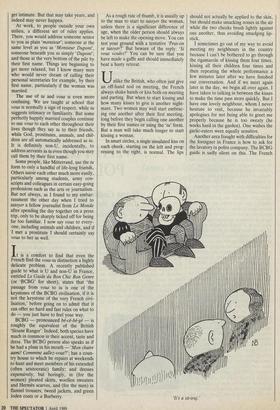. . . WITH FRENCH POLISH
Diana Geddes puts her foot in the intricacies of etiquette in France Paris OH, the agonies of French etiquette! I have lived here for nearly seven years now and continue to make terrible gaffes. Out at dinner the other night, I was introduced to a French admiral. `Bonsoir, mon amir- al,' I said with a smile, knowing that the French like you to use their titles. The admiral looked discomforted, and my hostess pulled me to one side. `Do you know him well?' she hissed. 'No, it's the first time I've met him,' I replied, taken aback. 'Well, you would only address him as "mon amiral" if she knew him in- timately,' she said fiercely. How was I to know? Didn't one call the local priest 'mon pere?' So why not 'mon amirar? The way one addresses French people is horribly complicated and, apparently, important. When greeting a president, prime minister or anyone else with a title linked to his function, one should always say, 'Bonjour, monsieur le president ... monsieur le premier ministre' or whatever, even when he no longer holds that post (Giscard is still 'Monsieur le presidene , for example). But it would be considered definitely non-U to address a member of the aristocracy by his title. On being introduced to the Marquis de X, one should say, 'Bonjour, monsieur', for exam- ple, never Bomjour, monsieur le marquis', and certainly not just 'Bonjour', which would be considered over-familiar and therefore rude.
In the absence of any formal titles, the subtleties are even greater. If you are introduced to someone of your own milieu, an aristocratic friend explained, you would say 'Bonjour, monsieur' on first meeting; `Bonjour, Monsieur Joly' when you get to know each other a little better; then simply `Bonjour, Joly', dropping the 'Monsieur', or perhaps 'Bonjour, cher amr , as your friendship grows, before finally getting down to first-name terms when you really get intimate. But that may take years, and indeed may never happen.
At work, to people outside your own milieu, a different set of rules applies. There, you would address someone senior to you as plain `monsieur'; someone at the same level as you as 'Monsieur Dupont', someone beneath you as simply 'Dupont% and those at the very bottom of the pile by their first name. Things are beginning to get more relaxed, but I know many men who would never dream of calling their personal secretaries for example, by their first name, particularly if the woman was married.
The use of tu and vous is even more confusing. We are taught at school that vous is normally a sign of respect, while tu suggests intimacy or familiarity. But some perfectly happily married couples continue to use vous to each other throughout their lives though they say tu to their friends, while God, prostitutes, animals, and chil- dren are all automatically addressed as tit. It is definitely non-U, incidentally, to address servants as tu even though you may call them by their first name.
Some people, like Mitterrand, use the tu form to only a handful of life-long friends, Others tutoie each other much more easily, particularly among students, army con- scripts and colleagues in certain easy-going professions such as the arts or journalism.
But not always, as I found to my embar- rassment the other day when I tried to tutoyer a fellow journalist from Le Monde after spending the day together on a press trip, only to be sharply ticked off for being far too familiar. I now say vous to every- one, including animals and children, and if I met a prostitute I should certainly say vous to her as well.
It is a comfort to find that even the French find the vous-tu distinction a highly delicate problem. A recently published guide to what is U and non-U in France, entitled Le Guide du Bon Chic Bon Genre (or `BCBG' for short), states that 'the passage from vous to tu is one of the keystones of the BCBG civilisation, if it is not the keystone of the very French civi- lisation,' before going on to admit that it can offer no hard and fast rules on what to do — you just have to feel your way.
BCBG — pronounced be-ce-be-ge — is roughly the equivalent of the British `Sloane Ranger'. Indeed, both species have much in common in their accent, taste and dress. The BCBG person also speaks as if he had a plum in his mouth — 'Mon chaire aami! Comment aallez-vous?'; has a coun- try house to which he repairs at weekends to hunt and meet members of his extended (often aristocratic) family; and dresses expensively, but boringly, in (for the women) pleated skirts, woollen sweaters and Hermes scarves, and (for the men) in flannel trousers, tweed jackets, and green loden coats or a Burberry. As a rough rule of thumb, it is usually up to the man to start to tutoyer the woman, unless there is a significant difference of age, when the older person should always be left to make the opening move. You can test your ground with a tentative `Peut-on se tutoyer?' But beware of the reply: 'Si vous voulez!' You can be sure that you have made a gaffe and should immediately beat a hasty retreat.
Unlike the British, who often just give an off-hand nod on meeting, the French always shake hands or kiss both on meeting and parting. But when to start kissing and how many kisses to give is another night- mare. Two women may well start embrac- ing one another after their first meeting, long before they begin calling one another by their first names or using the 'tu' form. But a man will take much longer to start kissing a woman.
In smart circles, a single simulated kiss on each cheek, starting on the left and prog- ressing to the right, is normal. The lips should not actually be applied to the skin, but should make smacking noises in the air while the two cheeks brush lightly against one another, thus avoiding smudging lip- stick.
I sometimes go out of my way to avoid meeting my neighbours in the country because I can't be bothered to go through the rigamarole of kissing them four times, kissing all their children four times and then repeating the whole performance a few minutes later after we have finished our conversation. And if we meet again later in the day, we begin all over again. I have taken to talking in between the kisses to make the time pass more quickly. But I have one lovely neighbour, whom I never hesitate to visit, because he invariably apologises for not being able to greet me properly because he is too sweaty (he works hard in the garden). One wishes the garlic-eaters were equally sensitive.
Another area fraught with difficulties for the foreigner in France is how to ask for the lavatory in polite company. The BCBG guide is sadly silent on this. The French `It's a sit-traj.' have no equivalent for the useful English expression 'going to the loo'. 'J'ai envie d'aller aux toilettes' (never 'a la toilette', incidentally) is considered fearfully non-U, while ifaire pis-pis' is only used for children or among intimates. So one is left with such feeble euphemisms as 'J'ai envie d'aller quelque part'; 'On peut se laver les mains?'; `Je peux m'absenter une seconde?' or Touvez-vous m'indiquer les petits coins?' BCBG families may talk of using the `wa-wa' or even the `chiottes' among them- selves, but not in public.
A final footnote on table manners. Unlike in Britain, it is considered very U to lift your little finger when raising your glass to drink. One's hands, when not being used for eating, should be left resting on the table. (Some say this was to prevent a person suddenly drawing his sword or dagger; others say it is to prevent children from 'playing' with themselves, or adults with one another, under the table.) Fruit should always be peeled using both a fork and knife. Food should be pushed onto one's fork with a lump of bread, never with a knife. Sadly, it is considered very vulgar to use one's bread to mop up all those delicious sauces. If you really must do so, be sure to use a fork, never your fingers. (I disregard this rule, as most others, explain- ing that I am an uncouth foreigner. As all foreigners are considered uncouth, it's normally all right.)




















































 Previous page
Previous page